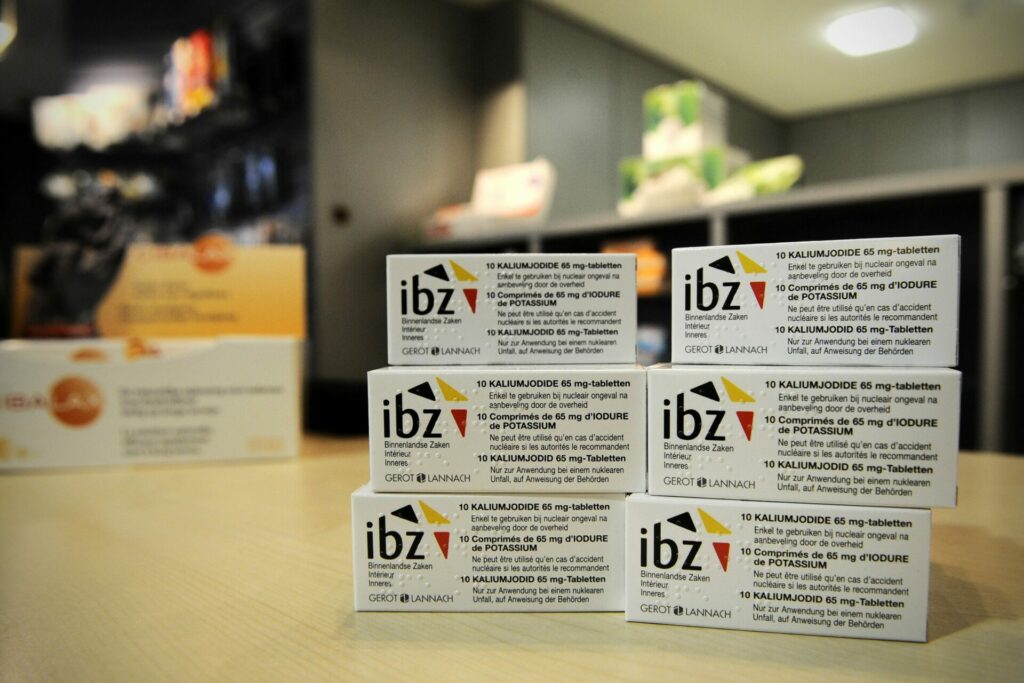Belgium's Federal Government is launching a new awareness-raising campaign to urge people to get a free box of iodine tablets to keep in their homes, particularly those living within 20 kilometres of a nuclear installation.
There are six nuclear sites on Belgian territory: Doel, Mol, Dessel and Geel in Flanders, and Fleurus and Tihange in Wallonia. Additionally, neighbouring countries also have a few plants near the Belgian borders: the Chooz plant in France is close to the Namur province, and the Dutch Borssele plant is close to the East Flanders province.
"The chance of serious accidents at a nuclear site is small, but not non-existent. In a nuclear accident involving a radioactive discharge, there is a risk to the environment and humans (internal or external radiation)," the National Crisis Centre said.
The presence of these nuclear sites "requires adequate preparation by the authorities and the population," they said, adding that one easy measure is having a box of iodine tablets in the house. These can be collected preventively and free of charge from the pharmacist.
Translation: Did you know that there are several nuclear sites in Belgium? Even if the risk is low, it's important to be informed and prepared. Get your free box of iodine tablets from your pharmacist.
The centre stated that this is a campaign that recurs every few years, and stressed that there is currently no concrete nuclear threat, despite the turbulent geopolitical times. "This is not scaremongering, but it is a good precaution for people to have a box in the house in case of a nuclear accident."
Importantly, the Crisis Centre warned that people should never just take iodine tablets preventively. "Taking them is only effective if it is done at the right time. Never take them on your own initiative. Always wait for the explicit official recommendations from the Belgian authorities."
Anyone who already has iodine tablets in their home is advised to check their production date. If the tablets date from 2011 or earlier, people can go to the pharmacist to exchange the box for free.
At the end of February 2022, over 30,000 Belgian residents went to the pharmacy to get free iodine tablets in one day, following reports of fighting near Chernobyl in Ukraine and nuclear threats from Russia about a week after the latter's invasion. Then, too, the authorities stressed they should never be taken on one's own initiative.
How do iodine tablets work?
In the event of a nuclear explosion, radioactive iodine may be released which can enter the body through the airways or through contaminated food. The thyroid gland stores iodine until it is saturated with it and would therefore cause radiation "from within."
By taking non-radioactive iodine – such as the tablets found in pharmacies – at the right time, you ensure that your thyroid gland is already saturated, the Federal Agency for Nuclear Control explained. This prevents the absorption of radioactive iodine.
"Iodine tablets are medicines. Never take the tablets on your own initiative but wait until the government recommends it," the Agency reiterated, adding that intake must always be accompanied by seeking shelter.
Depending on someone's age, a different dose is needed, as explained in the tablets' information leaflet. In principle, iodine tablets are only used once: on the day that it is recommended.
Related News
- Belgium unprepared against nuclear attack as threat of war escalates
- Belgians rush for free iodine tablets after nuclear threat
- 'Mission accomplished': Belgium signs off its nuclear energy future
People over 40 years old and people with thyroid and/or heart disease or those who are hypersensitive to iodine should discuss taking the tablets with their attending physician or specialist beforehand, as it may have a toxic effect on them.
The iodine tablets are distributed in a pack of ten pills, enough for a family of four. If they are stored correctly, the tablets remain usable for at least 10 to 15 years after the production date (which is printed on the box).
All information on nuclear risk in Belgium can be found here.

